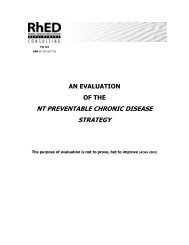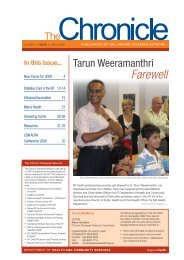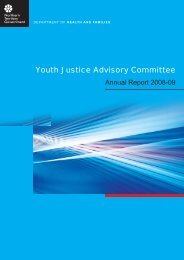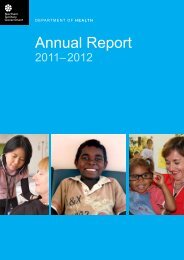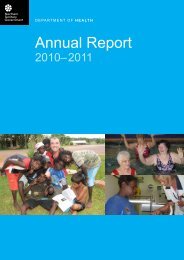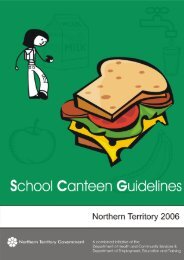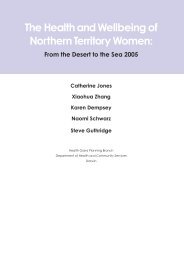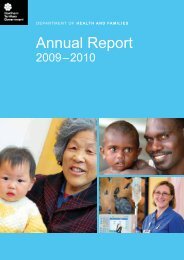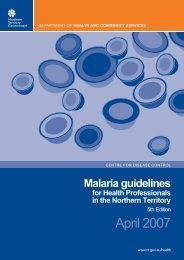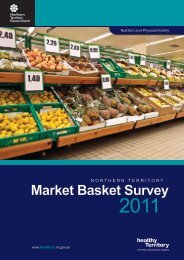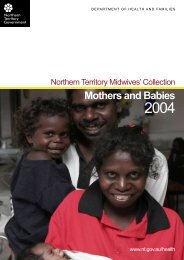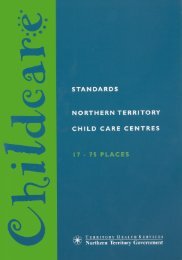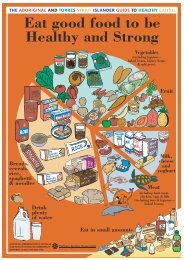Untitled - DHCS Digital Library
Untitled - DHCS Digital Library
Untitled - DHCS Digital Library
Create successful ePaper yourself
Turn your PDF publications into a flip-book with our unique Google optimized e-Paper software.
Contents<br />
PART 1<br />
BUILDINGS AND PHYSICAL ENVIRONMENT<br />
1 Space Requirements Page 2<br />
2 Building Cleanliness and Repairs Page 2<br />
3 Food Preparation Facilities Page 3<br />
4 Toilets Page 3<br />
5 Storage Facilities Page 3<br />
6 Equipment Page 4<br />
7 Telephone Facilities Page 4<br />
8 Pools Page 4<br />
PART 2<br />
SAFETY, HEALTH AND HYGIENE PRACTICES<br />
9 Infectious Diseases Page 5<br />
10 Illness and Accidents Page 5<br />
11 First Aid Facilities and Qualifications Page 6<br />
12 Medication Page 7<br />
13 Food Page 7<br />
14 Drinking Water Page 7<br />
15 Health of Staff and Children Page 8<br />
16 Staff Interaction with Children Page 9<br />
17 Animals Page 9<br />
18 Emergency Procedures/Fire Drills Page 10<br />
19 Transport Page 11
PART 3<br />
STAFFING<br />
20 Staff:Child Ratios Page 12<br />
21 Staff Qualifications/Training Page 13<br />
22 Minimum Staff Numbers Page 14<br />
23 Fit and Proper Persons Page 16<br />
24 Excursions Page 16<br />
PART 4<br />
OPERATING PROCEDURES<br />
25 Policy Page 17<br />
26 Written Programs Page 18<br />
27 Hours of Operation and Procedures<br />
for Collecting Children Page 18<br />
28 Access Page 18<br />
29 Participation and Access Page 18<br />
30 Insurance Page 19<br />
31 Maintenance of Records Page 19<br />
PART 5<br />
CHARTER OF RIGHTS AND<br />
COMPLAINT MANAGEMENT<br />
A Charter of Rights and Responsibilities Page 21<br />
Protocols for Managing Complaints Page 25<br />
List of Agencies where complaints may be lodged Page 27
Introduction<br />
Care for school aged children is an important factor in the lives of many<br />
families today. The expansion of care services specifically for primary<br />
school aged children has meant that Outside School Hours Care<br />
(OSHC) services are an integral part of many children’s lives in the<br />
Northern Territory. This booklet Guidelines for Outside School<br />
Hours Care in the Northern Territory has been developed to<br />
support the provision of quality OSHC services. It is designed to<br />
provide information to current and potential OSHC service providers<br />
and to act as a reference document for parents and families seeking<br />
care for children outside school hours.<br />
These guidelines form the basis for the provision of a quality service to<br />
school aged children and their families. It is anticipated that services<br />
will endeavour to provide standards beyond the minimum to ensure<br />
high quality care for children.<br />
Guidelines for Outside School Hours Care Services in the Northern<br />
Territory has been developed in consultation with OSHC services in<br />
the Northern Territory to reflect a Northern Territory perspective.<br />
These guidelines incorporate the National Minimum Standards<br />
endorsed by the Council of Community Services Ministers in 1995.<br />
Definition of a parent:<br />
Throughout this booklet, any reference made to “parent” inclusively<br />
refers to a child’s parent, legal guardian, custodian or a person with<br />
written authorisation from any of the afore mentioned individuals.
Buildings and<br />
Physical Environment<br />
1 SPACE REQUIREMENTS<br />
1.1 The indoor space requirement shall be 3.25 m 2 of<br />
unencumbered play space per child. When calculating this<br />
space such items as any passageway or thoroughfare,<br />
kitchen, toilet or shower area located in the building or<br />
any other facility such as cupboards are to be excluded.<br />
1.2 The outdoor space requirement shall be 12 m 2 of useable<br />
play space per child.<br />
2 BUILDING CLEANLINESS, MAINTENANCE<br />
AND REPAIRS<br />
2.1 The service shall ensure that the venue, grounds, and<br />
all equipment and furnishings used by the service are<br />
maintained in a safe, clean, hygienic condition and in<br />
good repair at all times.<br />
2.2 Every effort shall be made to maintain a vermin free environment.<br />
2.3 Suitable receptacles, with lids, for the temporary storage of<br />
kitchen refuse and garbage shall emptied daily.<br />
2.4 The program area shall have appropriate heating, ventilation<br />
and lighting.<br />
2
2.5 Hazardous machinery, chemicals and activities which are likely to<br />
cause potential danger to children are not to be used or undertaken<br />
while the service is in operation.<br />
3 FOOD PREPARATION FACILITIES<br />
3.1 Safe, hygienic facilities including a sink, refrigerator and hot<br />
and cold running water supply shall be accessible to staff, for<br />
the preparation, storage, heating and cooking of food for children.<br />
These facilities shall be in a room where the program usually runs<br />
or accessible to the service.<br />
4 TOILETS AND HAND BASINS<br />
4.1 Services shall provide:<br />
(a)<br />
(b)<br />
(c)<br />
one toilet for every 15 children or part thereof;<br />
hand washing facilities; and<br />
soap and hand drying equipment.<br />
5 STORAGE FACILITIES<br />
5.1 The service shall have secure storage facilities for indoor<br />
and outdoor equipment.<br />
5.2 The service shall have storage facilities which are secure and<br />
inaccessible to children for cleaning materials, disinfectants,<br />
flammables, poisonous and other dangerous substances, tools,<br />
toiletries, first aid equipment, medication and program records.<br />
3
6 EQUIPMENT<br />
6.1 The OSHC service shall ensure that children have access to<br />
a range of equipment and materials which are suitable, safe<br />
and well maintained.<br />
7 TELEPHONE FACILITIES<br />
7.1 The OSHC service shall have an operating telephone which is<br />
immediately accessible to staff at all times, including when on<br />
excursions that involve leaving the close proximity of the service.*<br />
Where the service is located in a remote area, appropriate<br />
alternatives such as an emergency 2-way UHF channel shall be used.<br />
8 POOLS<br />
8.1 All paddling and wading pools shall be emptied after use and<br />
stored to prevent the collection of water.<br />
8.2 Isolation swimming pool fencing and gates which comply with<br />
Australian Standard 1926 and Australian Standard 2820 must be<br />
provided. Effective barriers should be in place to prevent access<br />
by any child in care to any area that opens directly into a<br />
fenced pool area.<br />
8.3 Water containers must be safely covered or inaccessible to children.<br />
8.4 Pool filters must be inaccessible to children in care.<br />
*Prior arrangements need to be made for immediate access to a phone<br />
in case of emergencies whilst on excursions. Alternatively, a mobile<br />
phone may be used.<br />
4
Safety, Health and<br />
Hygiene Practices<br />
9 INFECTIOUS DISEASES<br />
9.1 The OSHC service shall ensure that it has a policy on<br />
infectious diseases consistent with Commonwealth and<br />
Territory legislation which outlines the exclusion practices for<br />
children who have an infectious disease or who have been<br />
exposed to an infectious disease and shall ensure that the<br />
policy is practised.<br />
9.2 Where information is provided about the occurrence in a<br />
service of an infectious disease, that information shall be<br />
made available to the parent of children in the service in a<br />
manner that is not prejudicial to the rights of individual staff<br />
or children and which does not infringe Commonwealth or<br />
Territory legislation.<br />
9.3 The OSHC service shall, as part of its policy, ensure that<br />
appropriate health and hygiene practices are observed,<br />
and that staff have access to current information provided by<br />
relevant authorities to minimise health risks to children and staff.<br />
10 ILLNESS AND ACCIDENTS<br />
10.1 If a child has an accident or becomes ill while attending the<br />
OSHC service, the service must ensure that:<br />
(a)<br />
the child is kept under adult supervision until the child<br />
recovers or until the child’s parent or other authorised<br />
person takes charge of the child;<br />
5
(b)<br />
if the child requires immediate medical aid in the service,<br />
all reasonable attempts are taken to secure that attention<br />
and to notify the parent of the accident or illness;<br />
(c)<br />
in the case of medication being required in an emergency<br />
without the prior consent of the parent, every attempt is<br />
made to secure that consent or consent from a registered<br />
medical practitioner;<br />
(d)<br />
in the case of serious injury requiring hospitalisation,<br />
procedures for the transportation of the child to hospital<br />
are implemented.<br />
11 FIRST AID FACILITIES AND QUALIFICATIONS<br />
11.1 A first aid kit must be maintained in effective order on<br />
the premises in a position that is inaccessible to children<br />
but readily accessible to staff in an emergency.<br />
11.2 One staff member present shall be currently qualified in first aid.<br />
6
12 MEDICATION<br />
12.1 Medication shall not be administered to a child unless the child’s<br />
parent has given written consent authorising administration.<br />
12.2 In an emergency when a child’s parent is unable to be contacted,<br />
medication shall only be administered with the permission of a<br />
medical practitioner.<br />
12.3 If any medication is administered by staff during the child<br />
care service, records shall be kept detailing the medication<br />
used, the date, time and dosage of administration and the<br />
person who administered it.<br />
13 FOOD<br />
13.1 The service shall ensure that food provided at the program<br />
shall be nutritious and varied.<br />
13.2 The service shall ensure that it has a policy on the provision<br />
of food and shall ensure that the policy is practised.<br />
14 DRINKING WATER<br />
14.1 Services shall ensure that drinking water is provided and<br />
available at all times.<br />
7
15 HEALTH OF STAFF AND CHILDREN<br />
15.1 Staff must be of good health and free from any medical<br />
condition or dependency on any medication and/or<br />
substance that may affect their ability to care for children.<br />
15.2 Staff requiring regular medication should hold a medical<br />
certificate confirming their ability to care for children.<br />
15.3 No person who is adversely affected by drugs or alcohol<br />
shall supervise, or remain in the presence of, a child in care.<br />
15.4 Staff shall not consume alcohol during the hours children<br />
are in care.<br />
15.5 The management body shall provide a smoke-free environment.<br />
15.6 Staff shall observe strict health, hygiene and sun protection<br />
practices in relation to children that have regard to current<br />
community standards and are in accordance with relevant<br />
government guidelines to minimise risks to children.<br />
15.7 Staff shall encourage children to observe these practices.<br />
8
16 STAFF INTERACTION WITH CHILDREN<br />
16.1 Appropriate standards of discipline shall be maintained by<br />
children being given positive guidance directed towards<br />
acceptable behaviour with encouragement freely given.<br />
16.2 The service shall ensure that the child is safe and secure and<br />
that the dignity and rights of the child are maintained at all times.<br />
16.3 Where a school age program operates within a school, attempts<br />
should be made to ensure that behaviour management strategies<br />
are consistent with those operating within the school.<br />
17 ANIMALS<br />
17.1 Any animal or bird kept by the service shall be maintained<br />
in a clean and healthy condition.<br />
17.2 The service shall ensure that no animal, bird or livestock be<br />
present in the program area which is likely to be a source of<br />
infection or which in any way may be detrimental to the<br />
well-being of the children.<br />
9
18 EMERGENCY PROCEDURES/FIRE DRILLS<br />
18.1 The service shall develop emergency procedures in<br />
consultation with the venue owner and any appropriate<br />
local authority.<br />
18.2 The service shall ensure that at least one person, who is<br />
trained in the use and identification of fire fighting equipment<br />
and the correct evacuation procedures for the service as set<br />
out by the local fire or emergency services authority, is on<br />
the premises at all times.<br />
18.3 The service shall ensure all staff and children are familiar with<br />
the emergency procedures.<br />
18.4 The service shall ensure that the emergency procedures are<br />
practised with the children a minimum of once per term<br />
(including new children and those who do not attend on a<br />
regular basis), or as determined by the relevant authority.<br />
18.5 The service shall ensure that the venue’s disaster plan includes<br />
a section dealing with the child care program.<br />
18.6 The OSHC service shall ensure that its policy includes<br />
procedures for managing harassment and/or threat to<br />
children by persons known and unknown to the service.<br />
10
Operating Procedures<br />
19 TRANSPORT<br />
19.1 The OSHC service shall ensure that:<br />
(a)<br />
vehicles used to transport children, comply with the appropriate<br />
road transport regulations;<br />
(b)<br />
its policy includes a procedure developed in the event of a vehicle<br />
breakdown and/or accident;<br />
(c)<br />
the child travelling has the written consent of the parent.<br />
11
Staffing<br />
20 STAFF:CHILD RATIOS<br />
(1) On site<br />
20.1 There shall be a maximum of 15 children to one staff member.<br />
(2) Excursions<br />
20.2<br />
(a)<br />
There shall be a maximum of 10 children to one carer for<br />
excursions to controlled environments for children aged<br />
five to eight years.<br />
(b)<br />
There shall be a maximum of 12 children to one carer for<br />
excursions to controlled environment for children aged nine<br />
to 12 years.<br />
Controlled environments include cinemas, tenpin bowling venues,<br />
skating rinks.<br />
20.3<br />
(a)<br />
There shall be a maximum of eight children to one carer for<br />
excursions to uncontrolled environments for children aged<br />
five to eight years.<br />
(b)<br />
There shall be a maximum of 10 children to one carer for<br />
excursions to uncontrolled environments for children aged<br />
nine to 12 years.<br />
Uncontrolled environments include national parks, beaches<br />
large parks.<br />
12
20.4<br />
(a)<br />
There shall be a maximum of eight children to one carer<br />
for swimming in controlled environments for children<br />
aged five to eight years.<br />
(b)<br />
There shall be a maximum of 10 children to one carer for<br />
swimming in controlled environments for children aged nine<br />
to 12 years.<br />
Controlled environments for swimming include public fenced pools.<br />
20.5<br />
(a)<br />
There shall be a maximum of five children to one carer for<br />
swimming in uncontrolled environments for children aged<br />
five to eight years.<br />
(b)<br />
There shall be a maximum of eight children to one carer for<br />
swimming in uncontrolled environments for children aged<br />
nine to 12 years.<br />
Uncontrolled environments for swimming include beaches,<br />
lakes, dams.<br />
21 STAFF QUALIFICATIONS/TRAINING<br />
21.1 OSHC coordinators are required to be qualified.*<br />
21.2 OSHC services must employ staff on the basis of a minimum of<br />
one qualified staff member to every 30 children, or part thereof.*<br />
* To be phased in by the year 2005<br />
13
21.3 A degree in teaching (Primary and/or Early Childhood), an<br />
Associate Diploma in child care and/or youth or recreation<br />
(experience in working with children aged five to 12 years<br />
is desirable) shall be considered as an acceptable qualification.<br />
The Commonwealth and Territory may review the listing<br />
of qualifications, on an annual basis, to ensure the relevance of<br />
the qualifications to OSHC services.<br />
21.4 Transitional arrangements may be developed to ensure that<br />
staff currently working in OSHC services are not disadvantaged<br />
by the introduction of the standard on qualifications.<br />
22 MINIMUM STAFF NUMBERS<br />
22.1 There shall be a minimum of two staff members present<br />
at any one time.<br />
22.2 In certain defined circumstances the minimum of two staff<br />
members may be waived if appropriate, and approved by the<br />
appropriate Territory/Commonwealth department.<br />
14
The defined circumstances in the Northern Territory for<br />
exemption of the minimum staff requirement are as follows:<br />
22.3 A single staff model may be used in before and after school<br />
care and pupil free days, and where the service attendance<br />
rate is consistently under 16 children and the following<br />
standards can be met:<br />
(a)<br />
There will be a maximum number of 15 children in care at<br />
any given time.<br />
(b)<br />
There will be a formalised process for ensuring that a staff<br />
member is in attendance.<br />
(c)<br />
There will be a list of at least four relief staff on call in the<br />
event that the service coordinator is not available.<br />
(d)<br />
Emergency procedures will be put in place and displayed with<br />
the crucial steps and appropriate telephone numbers in a manner<br />
which children can interpret in the event of the coordinator<br />
being involved in an accident or otherwise unavailable.<br />
N.B.<br />
Excursions away from the close proximity of the service require<br />
the normal staff:child ratio as set out in Guideline 20.<br />
15
23 FIT AND PROPER PERSONS<br />
23.1 A carer shall be a fit and proper person to undertake paid<br />
or unpaid work in the OSHC service.<br />
23.2 A person is fit and proper if:<br />
(a)<br />
the person is capable of providing an adequate standard of<br />
child care in the OSHC setting;<br />
(b)<br />
the person is of good character and is suitable to be entrusted<br />
with the care of children.<br />
24 EXCURSIONS<br />
24.1 The OSHC service shall approve all excursions and:<br />
(a)<br />
only take a child outside the program area with the written<br />
permission of the child’s parent for that specific excursion;<br />
(b)<br />
ensure that a first aid kit, a list of all children on the excursion<br />
and the appropriate emergency telephone numbers are taken<br />
on every excursion and are readily accessible to staff at all times;<br />
(c)<br />
ensure that parents are provided with the details of each excursion.<br />
16
Operating Procedures<br />
25 POLICY<br />
25.1 Services shall develop an operational policy. The policy shall<br />
include sections on the service’s philosophy, administration,<br />
staffing, facilities and equipment, health and safety, programming,<br />
fees, participation of parents, cultural relevance, attention to<br />
children with a disability, gender equity, excursions and reporting<br />
of child abuse.<br />
25.2 The OSHC service shall:<br />
(a)<br />
display the policy prominently in the program area and shall<br />
make the policy available to the parent on the child’s enrolment<br />
and on request at other times;<br />
(b)<br />
review the policy on an annual basis.<br />
26 WRITTEN PROGRAMS<br />
26.1 Programs shall be designed and evaluated with regard to<br />
each child’s out of school hours social, physical, emotional,<br />
recreational, intellectual and creative developmental needs.<br />
26.2 Programs of activities shall be regularly developed and<br />
displayed at service venues.<br />
17
26.3 Programs of activities shall be available to all parents including<br />
persons who do not regularly attend the service venue.<br />
27 HOURS OF OPERATION AND PROCEDURES<br />
FOR COLLECTING CHILDREN<br />
27.1 The OSHC service shall ensure that its policy includes the<br />
operating hours for the program and procedures for the<br />
collection of children.<br />
28 ACCESS<br />
28.1 The OSHC service shall ensure that its policy includes priority<br />
of access procedures. These procedures must ensure that the<br />
organisational arrangements and activities undertaken as part<br />
of the program are inclusive of all groups in the community in<br />
which the service operates.<br />
29 PARTICIPATION AND ACCESS<br />
29.1 The OSHC service shall ensure that its policy includes a procedure:<br />
(a)<br />
to ensure that the parent may enter the service at any time<br />
and may, at an appointed time, exchange detailed information<br />
about their child with the coordinator;<br />
(b)<br />
to allow for the management of complaints by a parent.<br />
18
30 INSURANCE<br />
30.1 The OSHC service shall ensure that there are current,<br />
appropriate public liability and adequate insurance policies<br />
in place in respect of the provision of the OSHC service.<br />
31 MAINTENANCE OF RECORDS<br />
31.1 OSHC services shall keep in a secure and accessible place<br />
records for each child relating to:<br />
a) personal details (name, address, date of birth);<br />
b) relevant medical details (if any);<br />
c) relevant custody details (if any);<br />
d) details of people authorised to collect children from the program;<br />
e) permission for the child to leave the program unaccompanied<br />
(if applicable);<br />
f) signing in and out of children at the beginning and/or end<br />
of programs;<br />
g) name, home and work address and phone numbers of parent;<br />
h) name, address and phone number of persons who may be<br />
contacted in an emergency (if parent is not available);<br />
i) name, address and phone number of the child’s doctor;<br />
j) authorisation to seek emergency medical, hospital and<br />
ambulance services (or the chosen alternative of the parent);<br />
k) any special needs or considerations in relation to the child;<br />
l) records as required by Guidelines 12.1, 12.2, 12.3 and 20.<br />
19
31.2 These records shall be confidential.<br />
31.3 The OSHC service shall ensure that a record is kept of a<br />
child’s illness or accident, where this occurs during the program.<br />
The record shall be kept in safe storage until the child turns<br />
24 years of age.<br />
31.4 The OSHC service shall ensure that:<br />
(a)<br />
a daily attendance roll is kept, indicating for each child, the<br />
time of entry to, and time of departure from, the service;<br />
(b)<br />
the policy includes a procedure to immediately advise the<br />
appropriate persons of a child’s absence, when that child’s<br />
place in the service has been reserved and/or the child is<br />
expected by staff.<br />
20
Charter of Rights and<br />
Complaints Management<br />
A Charter of Rights and Responsibilites of OSHC Service<br />
Providers, Parents and Children<br />
Providing a quality OSHC service for children and their families involves<br />
the development of partnerships between parents, staff and children<br />
Each individual within these partnerships has important skills and<br />
knowledge to contribute as well as unique perspectives. In all<br />
partnerships each member has particular rights and responsibilities.<br />
Clear understanding of these rights and responsibilities ensures that<br />
partnerships are positive and productive.<br />
Parents and services should recognise that the child’s best interest is<br />
the principle factor in the relationship between the child care provider<br />
and the parent.<br />
The Australian Early Childhood Association’s Code of Ethics is a useful<br />
document for guiding interactions between parents/staff and children<br />
as well as a valuable resource in the management of complaints.<br />
These following principles may also be useful in developing policies and<br />
procedures that aim to resolve grievances or complaints made against<br />
the service by a parent or child using the service.<br />
Services have a responsibility to:<br />
a) provide an appropriate service for school age children, and<br />
to ensure all children receive a high standard of care;<br />
21
) develop and maintain positive relationships with parents and<br />
children and encourage parental participation in aspects of<br />
the program;<br />
c) plan a program taking into account the specific and diverse<br />
needs of children and their families;<br />
d) ensure the program is adequately staffed at all times;<br />
e) make sure that facilities and equipment are kept clean and<br />
in good condition and to advise the management of the need<br />
to upgrade and repair resources and facilities.<br />
Parents have a responsibility to:<br />
a) inform the program regarding the attendance and needs<br />
of their children;<br />
b) take an active interest in the program and support the director<br />
and other staff in their roles;<br />
c) ensure children are collected on time;<br />
d) pay fees on time.<br />
Children have a responsibility to:<br />
a) participate in the program to their level of interest and<br />
ability without disrupting others;<br />
22
) assist in ensuring the facilities and equipment are kept in a clean,<br />
safe and good condition;<br />
c) participate in the planning of the program.<br />
Services have the right to:<br />
a) be recognised as a professional service employing professional staff;<br />
b) refuse admittance to staff and children with a communicable disease.<br />
Parents have the right to:<br />
a) access any information including written policies and procedures<br />
that may effect their children in care before enrolling their child<br />
and at any stage thereafter;<br />
b) be involved in any decisions regarding their child;<br />
c) access information acquired by the program relating to their<br />
children. It should be recognised that services can best cater<br />
for the needs of a child when provided with appropriate and<br />
sufficient information relating to that child;<br />
d) have their needs and wishes acknowledged and<br />
incorporated into the daily program of the service;<br />
23
e) approach the service, management or sponsor with any<br />
grievance or complaint against the service and to have this<br />
complaint managed effectively, sensitively and confidentially;<br />
f) ensure that information provided by themselves relating to<br />
their children is kept confidential.<br />
Children have the right to:<br />
a) be involved in any decision regarding themselves to the<br />
level to which they are competent and comfortable;<br />
b) have their needs and wishes acknowledged and incorporated<br />
into the daily program of the service;<br />
c) make complaints and to have all complaints managed effectively,<br />
sensitively and confidentially;<br />
d) know and understand policies and procedures affecting the<br />
care they are receiving.<br />
24
Protocols for<br />
Managing Complaints<br />
The majority of OSHC programs strive to provide the best service<br />
possible to the children and their families using the service as well<br />
as to the staff employed. There are, however, occasions where<br />
misunderstandings or conflicts may occur.<br />
These misunderstandings may be avoided where there is clear<br />
information available about the service’s philosophy, policies and<br />
procedures and where individuals understand their rights and<br />
responsibilities (refer page 21). The OSHC service should have in place<br />
policies and procedures to address complaints and grievances and be<br />
able to manage issues, as and when they arise, in a professional manner.<br />
Each complaint should be treated on an individual basis, dependant on<br />
the nature and circumstances of the complaint and the people involved.<br />
In the event of a complaint or alleged breach of these guidelines the<br />
following procedures may assist:<br />
• Complaints should be made calmly and as soon as possible.<br />
• Complaints should be made to the person with the ability<br />
to address the issue.<br />
• Arrange an appointment so undivided attention can be given<br />
to the matter.<br />
• It is often beneficial to put complaints in writing, outlining<br />
the concern, what effect this is having and possible solutions.<br />
25
• If the complaint is verbal, keep note of who you spoke to<br />
and what action would be taken to resolve the problem.<br />
Procedure<br />
In the first instance the complaint should be raised with the service<br />
provider directly. All efforts by both parties should be made to resolve<br />
the matter quickly and appropriately.<br />
If the matter is not resolved or not resolved to the satisfaction of the<br />
complainant, the matter should then be raised in writing to the<br />
management of the service or the sponsoring body.<br />
In the case of serious breaches of guidelines or where the matter remains<br />
unresolved, complainants could contact the appropriate agency in relation<br />
to the area of complaint (list provided at page 27).<br />
26
List of Agencies Where<br />
Complaints may be Lodged<br />
Area of Complaint<br />
Staffing<br />
Relevant Authority<br />
Australian Liquor<br />
Hospitality &<br />
Miscellaneous Workers<br />
Union<br />
Work Health Authority,<br />
Department Industries<br />
and Business<br />
Northern Territory<br />
Chamber of Commerce<br />
and Industry<br />
Anti Discrimination<br />
Commission<br />
Safety, Health &<br />
Hygiene Practices<br />
Child and Family<br />
Protective Services,<br />
Territory Health Services<br />
The Environmental<br />
Health Unit, Territory<br />
Health Services<br />
Local councils<br />
Health and Community<br />
Services Complaints<br />
Commission<br />
Emergency Services<br />
Road Transport Services,<br />
Department Transport<br />
and Works<br />
27
Area of Complaint<br />
Safety, Health &<br />
Hygiene Practices<br />
Access to Services<br />
Buildings and<br />
Physical<br />
Environments<br />
Other Agencies<br />
Relevant Authority<br />
Motor Vehicle Registry,<br />
Department of<br />
Transport and Works<br />
Anti Discrimination<br />
Commission<br />
Department of Family<br />
and Community Services<br />
Building Advisory<br />
Services Branch,<br />
Department of Land,<br />
Planning and<br />
Environment<br />
The Environmental<br />
Health Unit, Territory<br />
Health Services<br />
Local councils<br />
The Ombudsman<br />
Office of Consumer<br />
Affairs and Fair Trading,<br />
Attorney-Generals<br />
Department<br />
The service’s Insurance<br />
Company<br />
Northern Territory Legal<br />
Aid Commission<br />
Roadworthiness of<br />
vehicles, seat belts<br />
& child restraints<br />
Discrimination in the<br />
service provided to<br />
children and families<br />
Priority of access<br />
guidelines in<br />
relation to<br />
Childcare Assistance<br />
Standard of<br />
building construction<br />
Environment of<br />
the service<br />
Environment of<br />
the service<br />
28



